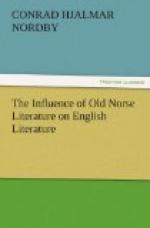8.
One more contribution to English literature hailing from the North, and we have done with William Morris’s splendid gifts. The volume of 1891, entitled Poems by the Way, contains several pieces that must be reckoned with. The vividest recollections of Icelandic materials here made use of are the poems “Iceland First Seen,” and “To the Muses of the North.” No reader of the poet’s biography can forget the remarkable journey that Morris made through Iceland, nor how he prepared for that journey with all the care and love of a pilgrim bound for a shrine of his deepest devotion. Every foot of ground was visited that had been hallowed by the noble souls and inspiring deeds of the past, and that pilgrimage warmed him to loving literary creation through the remainder of his life. The last two stanzas of the first of the poems just mentioned show what a strong hold the forsaken island had upon his affections, and go far to explain the success of his Icelandic work:
O Queen of the grief without knowledge, of the courage that may not avail, Of the longing that may not attain, of the love that shall never forget, More joy than the gladness of laughter thy voice hath amidst of its wail: More hope than of pleasure fulfilled amidst of thy blindness is set; More glorious than gaining of all thine unfaltering hand that shall fail: For what is the mark on thy brow but the brand that thy Brynhild doth bear? Lone once, and loved and undone by a love that no ages outwear.
Ah! when thy Balder conies back, and bears from the heart of the Sun Peace and the healing of pain, and the wisdom that waiteth no more; And the lilies are laid on thy brow ’mid the crown of the deeds thou hast done; And the roses spring up by thy feet that the rocks of the wilderness wore. Ah! when thy Balder comes back and we gather the gains he hath won, Shall we not linger a little to talk of thy sweetness of old, Yea, turn back awhile to thy travail whence the Gods stood aloof to behold?
In several other poems in this volume he recurs to the practice of his romances, Scandinavianizes where the tendency of other poets would be to mediaevalize. “Of the Wooing of Hallbiorn the Strong,” and “The Raven and the King’s Daughter” are examples. Here we have ballads like those that Coleridge and Keats conceived on occasion, full of the beauty that lends itself so kindly to painted-glass decoration; clustered spear-shafts, crested helms and curling banners, and everywhere lily hands combing yellow hair or broidering silken standards. But the names strike a strange note in these songs of Morris, and the accompaniments are very different from the mediaeval kind:




